
AMERICAN JOURNAL OF RESPIRATORY AND CRITICAL CARE MEDICINE
Scope & Guideline
Enhancing clinical outcomes through impactful research.
Introduction
Aims and Scopes
- Respiratory Diseases:
The journal addresses a wide range of respiratory diseases, including asthma, chronic obstructive pulmonary disease (COPD), interstitial lung disease, and pulmonary hypertension, emphasizing both clinical and molecular research. - Critical Care Medicine:
The focus extends to critical care medicine, particularly the management of patients with acute respiratory distress syndrome (ARDS), sepsis, and other critical conditions, highlighting advancements in intensive care practices. - Molecular and Cellular Biology:
Research published in the journal often explores the underlying molecular and cellular mechanisms of lung diseases, including studies on gene expression, inflammation, and immune response. - Innovative Therapeutic Approaches:
The journal features studies on novel therapeutic strategies, including pharmacological interventions, biologics, and emerging therapies for various pulmonary conditions. - Public Health and Epidemiology:
The journal also emphasizes public health issues related to respiratory diseases, including studies on the impact of environmental factors, tobacco use, and healthcare disparities. - Patient-Centered Research:
There is a strong focus on patient-reported outcomes and quality of life, aiming to integrate patient perspectives into research and clinical care.
Trending and Emerging
- Personalized Medicine:
Emerging research focuses on tailoring treatments based on genetic, environmental, and lifestyle factors, particularly in conditions like asthma and pulmonary fibrosis, emphasizing the importance of individualized patient care. - Telemedicine and Remote Monitoring:
The COVID-19 pandemic has accelerated the adoption of telemedicine and remote patient monitoring technologies, leading to an increase in studies evaluating their effectiveness in managing chronic respiratory diseases. - Long-COVID and Post-Acute Sequelae:
There is growing attention on the long-term effects of COVID-19, including post-acute sequelae, with research exploring respiratory, cardiovascular, and neurological implications, highlighting the need for comprehensive care strategies. - Microbiome Research:
Increasing interest in the role of the lung microbiome in health and disease, particularly its impact on asthma, COPD, and pulmonary infections, is emerging as a significant area of research. - Innovations in Imaging Techniques:
Advancements in imaging technologies, such as machine learning applications in radiology and novel imaging biomarkers, are gaining prominence for their potential to enhance diagnosis and monitoring of lung diseases. - Environmental and Social Determinants of Health:
Research increasingly emphasizes the impact of environmental factors and social determinants on respiratory health, focusing on disparities and the need for community-based interventions.
Declining or Waning
- Traditional Diagnostic Methods:
There appears to be a decreasing emphasis on traditional diagnostic methods, such as bronchoscopies and lung biopsies, as newer, less invasive techniques and imaging modalities gain traction. - Basic Science without Clinical Correlation:
Research focusing solely on basic science without direct clinical implications or applications is becoming less prevalent, as there is a greater push for translational research that bridges laboratory findings to patient care. - General Pulmonary Rehabilitation:
While pulmonary rehabilitation remains important, there is a shift towards more specialized and targeted rehabilitation practices rather than general approaches, leading to a decline in studies focusing on broad rehabilitation protocols. - Conventional Pharmaceutical Approaches:
There is a noticeable reduction in studies promoting conventional pharmaceutical approaches, with more research being directed towards personalized medicine and biologic therapies. - Single Disease Focus:
Research that concentrates on single diseases, such as isolated studies on asthma or COPD without considering comorbidities, appears to be waning in favor of studies that examine the interplay between multiple conditions.
Similar Journals
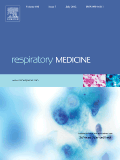
RESPIRATORY MEDICINE
Championing Excellence in Pulmonary ResearchRespiratory Medicine is a leading journal in the field of pulmonary and respiratory medicine, dedicated to advancing knowledge and research from 1989 to 2024. Published by W B Saunders Co Ltd, this esteemed journal is recognized for its high impact, reflected in its Q1 quartile ranking in 2023 within the category of Pulmonary and Respiratory Medicine and its impressive Scopus ranking of 27 out of 155 journals, placing it in the 82nd percentile. With a focus on publishing groundbreaking research, comprehensive reviews, and innovative practices, Respiratory Medicine serves as an essential resource for health professionals, researchers, and students aiming to improve patient outcomes and understand complex respiratory conditions. While the journal is not Open Access, its contributions to the scientific community are invaluable, providing insights that drive both academic and clinical advancements in respiratory health.

Clinical Medicine Insights-Circulatory Respiratory and Pulmonary Medicine
Innovating Clinical Insights for Better Patient OutcomesClinical Medicine Insights-Circulatory Respiratory and Pulmonary Medicine, published by SAGE Publications Ltd, stands as a vital resource in the fields of Cardiology and Pulmonary Medicine, underscored by its Q3 quartile rankings in both areas for 2023. Established in 2007 as an open-access journal, it facilitates the dissemination of cutting-edge research and observations from the international scientific community. With an ISSN of 1179-5484, the journal has garnered recognition for its contributions to clinical medicine, particularly covering topics of circulatory, respiratory, and pulmonary health. The journal not only aims to bridge the gap between research and clinical practice but also to serve as a platform for innovative ideas and collaborations among researchers, healthcare professionals, and trainees. By offering unrestricted access to its articles, Clinical Medicine Insights ensures that vital knowledge reaches a broad audience, ultimately fostering advancements in medical science and patient care.
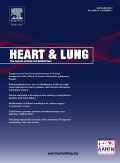
HEART & LUNG
Exploring the Frontiers of Cardiovascular and Respiratory MedicineHEART & LUNG is a premier academic journal published by MOSBY-ELSEVIER, focusing on the critical intersections of cardiology, critical care, and respiratory medicine. Since its inception in 1973, the journal has established a significant reputation within the medical community, as evidenced by its impressive Q2 ranking in key categories such as Cardiology and Cardiovascular Medicine, Critical Care and Intensive Care Medicine, and Pulmonary and Respiratory Medicine for the year 2023. With a dedicated readership comprising researchers, healthcare professionals, and students, HEART & LUNG serves as a vital platform for disseminating cutting-edge research, clinical innovations, and comprehensive reviews that influence practice standards and enhance patient care. While it currently does not offer Open Access options, readers can access a wealth of information pivotal to the advancement of medical knowledge and practice through conventional subscription. Explore the latest findings and contribute to the ever-evolving landscape of cardiovascular and respiratory health through this esteemed journal.
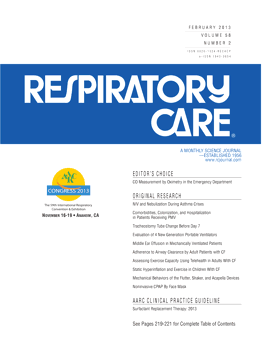
Respiratory Care
Advancing the Frontiers of Respiratory Medicine.Respiratory Care is a leading journal in the fields of Critical Care, Intensive Care Medicine, and Pulmonary and Respiratory Medicine, published by DAEDALUS ENTERPRISES INC. With a history dating back to 1973 and continuing through 2024, this journal serves as a vital platform for disseminating innovative research findings, clinical practices, and advancements in respiratory healthcare. The journal is recognized for its impact, reflected in its impressive Q2 quartile rankings across several categories in 2023, demonstrating its relevance and influence in the medical community. Although it is not an Open Access publication, it provides critical insights and foster discussions aimed at enhancing patient care and treatment protocols for respiratory diseases. The journal is indexed in notable databases, ensuring wide visibility and accessibility of its content to researchers, professionals, and students dedicated to advancing knowledge and practice in respiratory care.
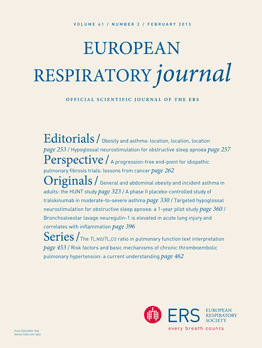
EUROPEAN RESPIRATORY JOURNAL
Advancing the Frontiers of Respiratory MedicineThe EUROPEAN RESPIRATORY JOURNAL, published by EUROPEAN RESPIRATORY SOC JOURNALS LTD, is at the forefront of advancing knowledge in the fields of pulmonary and respiratory medicine. With its ISSN 0903-1936 and E-ISSN 1399-3003, this esteemed journal has established itself as a leading platform since its inception in 1988, currently converging towards 2024. Ranked in the Q1 category for both Medicine (miscellaneous) and Pulmonary and Respiratory Medicine in 2023, it stands as the 3rd of 155 journals in its field, reflecting an impressive 98th percentile Scopus ranking. The journal boasts a rigorous selection of peer-reviewed articles that encompass innovative research, clinical studies, and reviews, thereby enhancing the understanding and treatment of respiratory diseases. Although it does not currently offer an Open Access option, the journal remains crucial for researchers, clinicians, and healthcare professionals committed to improving respiratory health across Europe and beyond. Join a community dedicated to groundbreaking research and advancements in respiratory medicine.

THORAX
Illuminating the path in pulmonary and respiratory studies.THORAX is a premier academic journal dedicated to advancing knowledge in the field of Pulmonary and Respiratory Medicine. Published by the esteemed BMJ Publishing Group in the United Kingdom, this journal has been a pivotal resource for researchers and clinicians since its inception in 1946. With a remarkable ranking of #6 out of 155 in its category, THORAX holds a prestigious position within the top 4% of its field, as indicated by its 2023 Q1 quartile classification and a strong Scopus ranking. The journal focuses on publishing high-quality research, reviews, and clinical studies that are essential for understanding respiratory diseases and their management. Although it is not an open-access journal, THORAX provides vital contributions to the academic community, fostering dialogue and innovation in pulmonary medicine. As it approaches its converged years, concluding in 2024, researchers, professionals, and students are encouraged to explore its rich repository of knowledge, while engaging with the most current advancements in the field.
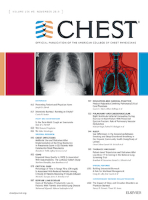
CHEST
Elevating the standards of pulmonary medicine research.CHEST is a premier journal published by Elsevier, focusing on the vital fields of cardiology, critical care, and pulmonary medicine. Established in 1970, this esteemed journal has continually provided authoritative research, reviews, and clinical studies, catering to a global audience of healthcare professionals, researchers, and students. With an impressive impact factor, CHEST ranks in the top quartile (Q1) across its core categories according to the latest Scopus metrics, securing its position as a leading resource within cardiology (Rank #16), pulmonary (Rank #9), and critical care (Rank #8). Published quarterly, it offers a wealth of knowledge essential for advancing understanding and improving patient outcomes in these critical areas of healthcare. Researchers and practitioners are encouraged to submit their work, contributing to the ongoing discourse that shapes innovative practices and policies in respiratory and cardiovascular health.
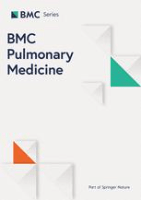
BMC Pulmonary Medicine
Empowering innovation in pulmonary medicine for a healthier tomorrow.BMC Pulmonary Medicine is a leading open access journal dedicated to the field of pulmonary and respiratory medicine, published by BMC since its inception in 2001. With an ISSN of 1471-2466, this journal plays a pivotal role in advancing knowledge and research dissemination in its field, maintaining a prominent position with a 2023 Scopus ranking of #65 out of 155 journals, placing it within the 58th percentile of the category. Based in the United Kingdom, it operates under a collaborative mission to provide unrestricted access to vital research, contributing to the global understanding of respiratory health issues. The journal is recognized for its commitment to high-quality, peer-reviewed research, as evidenced by its Q2 category designation in Pulmonary and Respiratory Medicine. BMC Pulmonary Medicine aims to foster innovation and scholarship among researchers, professionals, and students, making it an indispensable resource for anyone engaged in pulmonary research and practice. The journal, accessible to everyone, enables the dissemination of impactful research that can influence clinical practice and policy worldwide.
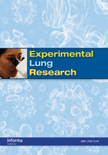
EXPERIMENTAL LUNG RESEARCH
Elevating Knowledge in Pulmonary and Respiratory MedicineEXPERIMENTAL LUNG RESEARCH, published by Taylor & Francis Inc, is a pivotal journal within the field of pulmonary and respiratory medicine, with its extensive coverage spanning from 1980 to 2024. The journal is indexed with ISSN 0190-2148 and E-ISSN 1521-0499, marking its commitment to disseminating high-quality research. With its Category Quartile rankings falling within Q3 in Clinical Biochemistry, Molecular Biology, and Pulmonary and Respiratory Medicine as of 2023, EXPERIMENTAL LUNG RESEARCH serves as a crucial platform for researchers and professionals seeking to explore innovative findings and advancements in lung physiology, pathology, and therapeutic approaches. Although currently not Open Access, it offers substantial insights through rigorous peer-reviewed articles that contribute significantly to the scientific community's understanding of respiratory health. With Scopus rankings reflecting its relevance within its categories, this journal attracts a diverse readership interested in advancing the field of lung research.
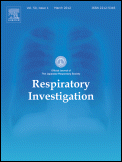
Respiratory Investigation
Transforming insights into impactful respiratory solutions.Respiratory Investigation is a leading peer-reviewed journal published by Elsevier, dedicated to advancing the field of Pulmonary and Respiratory Medicine. Since its inception in 2012, the journal has grown to become a vital resource for researchers, clinicians, and students alike, providing a platform for high-quality research articles, reviews, and clinical studies. With a commendable impact factor and ranked in the Q2 category of Scopus' 2023 metrics, it stands at rank #57 out of 155 in its field, illustrating its importance and influence within the academic community. Although the journal operates on a subscription basis, it remains committed to disseminating essential findings that enhance the understanding and treatment of respiratory diseases. Set against the innovative backdrop of the Netherlands, Respiratory Investigation not only serves as a conduit for scholarly exchange but also plays a critical role in shaping future research directions and clinical practices.